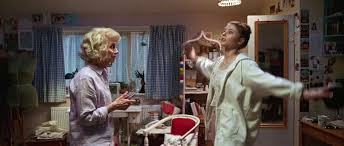Oscar favourite and eventual winner of only Best Director for 2022. A lot of things fell into place regarding the Academy Awards once I saw this but I’m not sure that I can draw too many firm conclusions about whether it is the masterpiece some critics claim it to be. Regarding the Oscars, I have come to the conclusion that this year was not a vintage year and that some of the winners (Coda as Best Picture) were far from the best in their category.

Back to this film. Jane Campion is an excellent director and has an eye that is original. Here she takes a story set in Montana in the 1920’s in a male chauvinist western ranch society and gives it a touch that both retains the Wild West atmosphere but also focuses on other aspects that many films overlook. Phil and George Burbank run a ranch owned by their parents who now live in town.
George is the dapper figures-minded brother who administers the place. Phil manages the physical side and is the boss of the farmhands. Personality-wise Phil is a terrible bully and when George marries local barmaid Rose and she and her son come to live on the ranch, he makes their lives hell both publicly and in private moments. Her son Peter discovers a secret about Phil and this surprisingly brings them closer together in a very unspoken way but all the time both sides are plotting ways of changing the reality of their lives.
If we regard this film as a Western, this is not your typical battle between the ranchers, the Indians, rustlers and the sheriff. It is an internal fight, between members of the same ranch and inside the individual characters. Some critics have dubbed it a psychodrama and this is a fair description, meaning also that the movie is a very slow burn and not perhaps the exciting event that western lovers are looking for.
Campion uses this backdrop to present us with a story of bullying and toxic masculinity which is timeless and she explores the psychological effects that this has on the people involved. So, yes, there is plenty of depth as in her other movies and much of the story or plot is made up of small moments which can make it seem as if it is going nowhere fast.
As regards the acting, Benedict Cumberbatch gives us a mean character who will go down as one of the more memorable villains in recent times but a man who is wrestling with his own feelings and memories and the image that he has built up of himself in public which contrasts with his probable homosexuality. Kirsten Dunst as Rose, a figure he hates precisely because she is a woman does some of her best work in a long time.
Jesse Plemons is also very solid as George and Kodi Smit McPhee is an unusual and effective character as Peter, future surgeon but also a boy unsuited to the rough macho world of the Wild West.
The photography of Ari Wegner captures this unrelenting dry area well and Jonny Greenwood’s score is like a worrying feature constantly keeping us alert.
I think Campion’s best director Oscar was well deserved because although you could complain about the pace of the movie, she gives us so much richness in the images. While it may seem that little is happening, in fact every shot counts, every image has relevance and there is plenty to go back and reflect on.
In summary, the film is a type of morality tale but in a most subtle way. I’m not sure that it is a total classic though. I found that I didn’t care too much for the characters which does not help a film last in the memory and may be the fact that much of the conflict is played under the surface makes it a little less engaging. Nonetheless, it is a quality piece of film-making.

4 stars plus
























































































